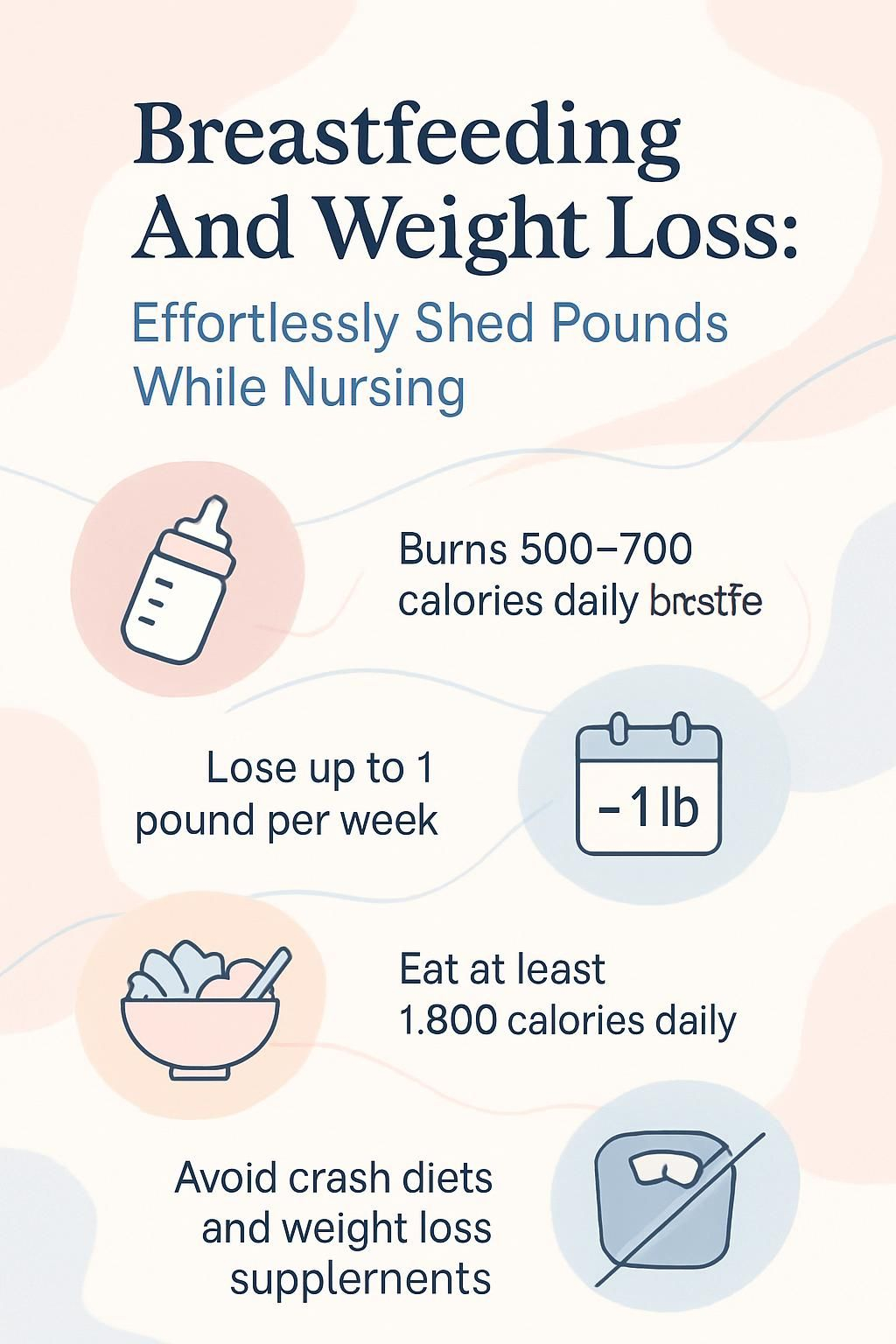Breastfeeding And Weight Loss: Effortlessly Shed Pounds While Nursing
Our Nutrition Assistant AI Suite will transform your body. You will lose fat, get toned, and build muscle. Gain confidence and optimal health.
Losing weight after childbirth can feel slow, especially in the early weeks. Breastfeeding and weight loss are connected, since making milk uses extra energy each day. With the right plan, you can support your baby and still make steady progress.
In this guide, you will learn how lactation changes your metabolism, which foods help you lose weight while breastfeeding, and how to protect a strong milk supply. Small shifts add up. Simple habits can make healthy weight loss feel more doable.
Key Takeaways
- Breastfeeding uses about 500 to 700 extra calories per day. Studies report mothers often lose an average of about 3.2 pounds more by one year postpartum when they breastfeed exclusively, compared with those who do not (Johns Hopkins; Stuebe and Amorim et al.).
- Safe progress is up to 1 pound per week. Aim for at least 1,800 calories per day and wait until your baby is about two months old before active dieting (Academy of Nutrition and Dietetics).
- Balanced meals built from whole grains, lean protein, fruits, vegetables, and healthy fats support gradual loss without hurting milk supply or infant growth (Dietary Guidelines for Americans, 2020–2025).
- Crash diets, strict fasting, very low carb plans, and weight loss supplements can lower milk production or pose risks for you or your baby (Lauwers and Swisher; Hart et al.; Campbell et al.; de Amorim et al.).
- Results vary. Genetics, pre-pregnancy weight, exclusive breastfeeding for at least three months, physical activity, and daily habits all influence postpartum weight change.

How Breastfeeding Supports Weight Loss

Breastfeeding increases your daily energy use, which can help with postpartum weight loss. As you nurse, your body pulls from stored fat to make milk.
How does breastfeeding increase calorie burn?
Making breast milk takes work. Most nursing parents burn 500 to 700 extra calories per day from lactation alone. Much of that energy comes from fat gained during pregnancy, which supports weight loss while breastfeeding.
The effect adds up over time. More frequent feeds and higher milk volume increase the total burn. In one analysis, exclusive breastfeeding for the first three months was linked with about 3.2 pounds more weight lost by one year postpartum than not breastfeeding or mixed feeding.
I struggled with stubborn weight after my second baby. Exclusive nursing for several months brought slow, steady progress back to my pre-pregnancy range.
“Each ounce of breast milk equals real work done by your body toward postpartum recovery.”
What hormonal changes help burn fat during nursing?
Nursing raises prolactin and oxytocin. Prolactin drives milk production and helps your body tap stored fat for energy. Oxytocin triggers let-down and promotes calm and fullness, which can reduce hunger.
Breastfeeding also delays ovulation for a time, which shifts hormones further. These changes increase energy use and may improve body mass index across the first postpartum year. Large cohorts, including work from Johns Hopkins, suggest that women who breastfeed often lose weight more efficiently than those who do not.
How does breastfeeding affect appetite regulation?
Those same hormones influence appetite. Higher oxytocin and prolactin can help you feel satisfied sooner, which may lower snacking or portion sizes. Exclusive breastfeeding often strengthens this effect.
Not everyone feels less hungry. Some mothers need more food to meet milk demands and still feel well. Matching intake to your hunger, while choosing nutrient-dense foods, supports healthy weight without strict dieting.
Benefits of Breastfeeding for Postpartum Weight Loss
Breastfeeding supports your energy needs and can promote gradual fat loss during the first year after childbirth. The process benefits both mother and baby.
How many calories does breastfeeding burn daily?
Most nursing mothers use an extra 500 to 700 calories per day. Exclusive breastfeeding often requires about 500 additional calories to meet energy needs and keep milk quality strong. The exact burn depends on feeding frequency and milk volume.
That energy does not all show up on the scale right away. A portion goes to healing after childbirth and keeping milk production steady. My appetite was higher during the first months, which made sense once my doctor at the local health department explained the extra energy costs of feeding.
How does breastfeeding promote gradual weight loss?
Lactation uses the calories you eat to make milk, which steadily taps fat stores. With exclusive breastfeeding, many parents see about 500 extra calories used each day.
This supports a safe pace of about 1 pound, or half a kilogram, per week. Research by Stuebe and Amorim et al. found mothers who breastfed exclusively for at least three months lost a larger share of body weight by one year than those who did not.
Healthcare groups, including the American Academy of Pediatrics, advise waiting until your infant is at least two months old before active dieting. This allows milk supply to stabilize.
Slow loss protects milk production and infant growth. My pediatrician urged balanced meals with whole grains, fruits, vegetables, protein, and healthy fats. That approach helped me lose weight without feeling depleted.
The best results come from breastfeeding plus modest calorie reduction and regular, low to moderate activity. This combination supports gradual, sustainable change.
What overall health benefits does breastfeeding provide for mother and baby?
Breast milk delivers ideal nutrition and immune support, especially in the first six months. Antibodies in milk help lower the risk of infections and diarrhea.
Oxytocin released during nursing supports bonding and may reduce the risk of postpartum depression. It also helps the uterus contract, which can ease discomfort after birth.
For mothers, breastfeeding is linked with lower rates of type 2 diabetes and breast cancer over time. Appetite tends to regulate more naturally, which can reduce overeating as you move toward your pre-pregnancy BMI. I felt calmer and more connected with my baby, and my mood steadied as our routine settled.
Key Guidelines for Safe Weight Loss While Breastfeeding
Use these science-backed steps to protect milk supply and health while you work on gentle loss.
What is a safe weekly weight loss goal while nursing?
Plan for about 1 pound, or 0.5 kg, per week and up to 4 pounds per month. This pace aligns with Academy of Nutrition and Dietetics guidance.
With medical clearance, some parents can lose up to 1.5 pounds weekly without lowering supply. Do not drop below 1,800 calories per day. Very low intake can cut milk volume and drain your energy.
Wait for your 6-week checkup before active weight loss. Many experts suggest waiting until your baby is at least 2 months old so supply is well established. In my first weeks as a new mom in New York City, patience paid off. Early scale changes were mostly fluid shifts, not fat loss.
How can I maintain a balanced, nutrient-rich diet?
Once you set a safe goal, build meals that supply vitamins, minerals, and steady energy. A balanced plate supports milk production and keeps hunger in check.
- Fill your day with fruits, vegetables, whole grains, lean proteins, and healthy fats.
- Eat five to six smaller meals and include high-fiber, high-protein snacks.
- Broil, bake, or steam instead of frying to limit unhealthy fat.
- Choose whole fruit over juice to increase fiber and blunt sugar spikes.
- Limit sugary drinks and processed snacks that add calories without lasting energy.
Keep a water bottle nearby during feeds. Skip crash or very low calorie plans. They can cut nutrients and lower supply. The Dietary Guidelines for Americans, 2020–2025, support balanced meals spread across the day to meet the higher needs of breastfeeding women.
Why is hydration important for milk production?
Breastfeeding raises your fluid needs. Many experts suggest about 12 cups, or 96 ounces, of water or unsweetened beverages daily.
Good hydration supports consistent milk output. Dehydration can reduce volume and make you feel unwell. Sip water during each feed, especially if you exercise or live in a hot climate.
Limit sugary drinks and keep caffeine modest. I found that sipping water every time I nursed helped prevent nausea and fatigue during the first three months. Adequate fluids also support digestion and recovery after birth.
Dietary Tips for Breastfeeding Moms
Daily food choices influence your milk supply and your ability to lose weight while breastfeeding. Simple swaps can move you forward without leaving you hungry.
What whole grains, proteins, and fats should I eat?
Choose whole grains such as oats, brown rice, and whole wheat breads. They provide steady energy, fiber, and B vitamins that help your body use fuel well.
Lean proteins include eggs, beans, chicken breast, fish, and Greek yogurt. Try bell peppers with bean dip or apple slices with peanut butter for a snack that balances protein and fiber.
Healthy fats support maternal energy and infant brain growth. Go for avocado, olive oil, nut butters, nuts, and seeds. Limit fried foods and sources of trans fat. Build meals around these nutrient-dense foods and add colorful produce for extra vitamins and minerals.
How can I include fruits and vegetables in every meal?
- Keep cut vegetables like carrots and peppers ready in the fridge.
- Add berries or banana to oatmeal or yogurt at breakfast.
- Pair veggie sticks with hummus or bean dip for fiber-rich snacks.
- Choose whole fruit instead of juice to control sugar and increase fiber.
- Fill half your dinner plate with vegetables, cooked or raw, for volume and nutrients.
These habits improve diet quality, support appetite control, and help maintain milk production while you work toward a healthy weight.
Why should I avoid drastic calorie cuts while breastfeeding?
Going below 1,800 calories per day can lower supply and leave you drained. Your body needs fuel for milk and healing.
Very low calorie diets may cause quick losses at first, but much of that comes from water and muscle, not fat. They also raise the risk of vitamin and mineral gaps for you and your baby.
I tried cutting hard during the first months with my daughter. My supply dipped within a week. Once I returned to balanced meals, her growth and my energy improved. Slow change is safer and easier to maintain.
Exercise and Breastfeeding: Finding the Right Balance
Movement supports recovery and mood. Think of exercise as a gentle partner to nutrition during the postpartum period.
What are the best postpartum exercises for breastfeeding moms?
Start with low impact options such as walking, gentle yoga, and swimming. They burn calories without stressing joints.
Walking with your baby builds connection and stamina. Light resistance work and stretching help rebuild core and pelvic floor strength.
Begin as cleared by your provider, often within weeks for easy walking. Many can return to more vigorous routines between 6 and 12 weeks, depending on healing. Combine aerobic activity with pelvic floor work to reduce injury risk and improve energy. Check in with your provider if supply or recovery concerns arise.
How can I manage energy levels during workouts?
Eat small, regular meals with whole grains, lean protein, vegetables, and healthy fats. This fuels workouts and nursing.
Hydrate before, during, and after activity to prevent fatigue and support milk output. Have a snack with protein or whole grains about 30 minutes before exercise to avoid low blood sugar.
Increase duration and intensity gradually. Watch for signs like unusual tiredness or dips in supply if you start burning more energy than usual. Oatmeal with fruit before morning walks helped my performance and kept me steady through feeds afterward.
When should I time workouts to protect milk supply?
Plan sessions right after breastfeeding or pumping. This reduces breast discomfort and often fits the natural rhythm of milk production.
Drink water before and after each session. Wait on high intensity routines until supply is stable, commonly around 6 to 12 weeks postpartum. If your baby’s growth slows or feeding patterns change as you become more active, talk with your provider or a lactation consultant. Research shows moderate exercise does not reduce milk amount or quality (Lauwers and Swisher, 2021; Campbell et al., 2024).
Common Concerns About Weight Loss While Breastfeeding
Many parents ask about fasting, low-carb plans, or supplements. Here is what evidence shows about safety and results.
Is intermittent fasting safe while breastfeeding?
Time-restricted eating plans are not recommended during lactation. Studies highlight limited safety data for nursing mothers and note potential drops in milk volume when calories are restricted for long stretches (Hart et al., 2022).
Your body needs steady energy and nutrients to produce milk and to recover. Eating balanced meals and snacks across the day can prevent overeating and keep energy stable. Skipping meals left me exhausted and less able to meet daily demands. Regular eating kept my supply and mood steadier. Speak with your healthcare provider before any major diet change.
Are low-carb diets recommended during nursing?
Strict low-carb plans, such as ketogenic approaches, are risky during breastfeeding. Very low carbohydrate intake has been linked to rare cases of lactational ketoacidosis, a serious condition that needs urgent medical care (de Amorim et al., 2024).
Mild to moderate carb reduction might be safe if total calories, protein, fruits, and vegetables remain adequate (Lauwers and Swisher, 2021). Still, experts caution against severe restriction, since low carbs can sap energy and may lower supply (Hart et al., 2022). Aim for a balanced pattern with carbs, protein, and fat from whole foods.
Sample Energy Distribution for Nursing Moms:
| Nutrient | Recommended Percentage (%) |
|---|---|
| Carbohydrates | 45–65 |
| Protein | 15–20 |
| Fat | 20–35 |
A balanced approach supports steady weight loss while protecting milk production and recovery after childbirth.
Can weight loss supplements impact milk production?
Supplements and shakes marketed for weight loss are not recommended while nursing. Many have ingredients that pass into milk and lack safety data for infants (Campbell et al., 2024). Some prescription drugs also cause side effects that can reduce nutrient intake or cause discomfort for you.
Quality control varies, so labels may not reflect what is inside. I tried a so-called natural product after my second pregnancy and noticed a quick dip in supply. Stopping it and focusing on real food helped my energy and milk volume return. Always talk with your healthcare provider before using any weight loss product while breastfeeding.
Factors That Influence Weight Loss During Breastfeeding
Every body is different. Several factors shape how quickly you lose weight while breastfeeding.
How do genetics and pre-pregnancy weight affect weight loss?
Genetics influence metabolism and fat loss. Family history can affect how easily you shed pounds after childbirth, even with the added calorie burn from nursing.
Pre-pregnancy BMI also matters. Some studies suggest the effect of breastfeeding on loss is stronger for those who were overweight or had obesity before pregnancy. Many women gain more than recommended during pregnancy, which can make postpartum loss slower. Duration and exclusivity of breastfeeding still help, but starting weight sets part of the path.
How does breastfeeding duration and exclusivity matter?
Exclusive breastfeeding for at least three months is linked with more loss by one year postpartum. In one analysis, this group lost about 3.2 pounds more and had higher odds of returning to pre-pregnancy weight than those who did not breastfeed exclusively.
If breastfeeding is not exclusive, the effect on weight is smaller or not significant in many studies. I found the first three months of exclusive nursing made it easier to drop some of the weight I had gained. Evidence at six months is limited by small sample sizes, but at least three months of exclusivity appears beneficial.
What role do lifestyle and activity levels play?
Daily habits still matter a great deal. Pairing regular movement with modest calorie reduction tends to outperform dieting alone. Dellapiana et al. (2024) reported greater loss among women who combined healthy eating patterns with activity.
Start small with walks or gentle yoga. As energy returns, add swimming or light resistance training. Build meals around whole grains, lean protein, produce, and healthy fats. A supportive partner, family member, or friend can make these habits easier to keep. Structured, extreme plans are hard to maintain for new parents.
Myths About Weight Loss and Breastfeeding
Misinformation can set frustrating expectations. Clear facts help you set a realistic plan.
Does breastfeeding guarantee weight loss for all moms?
No single choice guarantees weight loss. In research, exclusive breastfeeding for three months led to about 3.2 pounds more loss by one year, but results varied widely.
Genetics, pre-pregnancy weight, and daily intake matter. Many women still met criteria for overweight or obesity at twelve months. If progress stalls, consider a check-in with your provider or a dietitian for tailored guidance.
Can losing weight too quickly harm milk supply?
Fast loss can reduce supply. Experts suggest no more than one pound per week, with at least 1,800 calories per day.
Large calorie cuts or intense exercise too soon can lower milk output. I tried skipping meals and adding long workouts, and my baby fussed more within days. Returning to balanced meals restored supply, and steady loss followed. Gentle, consistent changes work best.
Is crash dieting a safe or effective method?
Crash diets often cause quick scale drops from water, not fat. Your body needs steady nutrition to produce milk and to heal.
Cutting too hard risks nutrient gaps and fatigue. Since breastfeeding already uses 500 to 700 calories daily, you can make progress without extreme restriction. Balanced eating plus light exercise after your six-week visit helped me lose pounds without affecting supply.
When to Seek Professional Guidance
Expert help can save time and protect milk supply. Reach out sooner rather than later if you are unsure.
When should I consult a lactation specialist?
Contact a lactation consultant for latch pain, nipple damage, feeding challenges, or supply worries. If your baby is not gaining well or seems unusually fussy at the breast, get help right away.
Ask about positions, pumping plans, or mixed feeding if nursing remains uncomfortable. A specialist can also review diet changes to support both weight loss and supply. Early support improved my comfort and my baby’s growth.
How can a dietitian help with personalized meal plans?
A registered dietitian can tailor meal plans to your needs and preferences. Plans typically ensure at least 1,800 calories daily to protect energy and milk production.
The focus is nutrient-dense foods, smart portions, and practical snacks. Hydration goals are included, often about 12 cups of fluids per day. If you have allergies, health conditions, or cultural preferences, a dietitian will adjust the plan while keeping weight loss and lactation goals in view.
What health issues may affect weight loss during breastfeeding?
Underlying conditions can slow progress. Hypothyroidism reduces metabolism and can make loss harder. Polycystic ovary syndrome, or PCOS, affects hormones and appetite signals.
Harsh restriction can also lower supply and make recovery harder. If you suspect a medical issue, speak with your healthcare provider for testing and guidance. Proper treatment can make your plan safer and more effective.
Conclusion
Breastfeeding supports postpartum weight loss by using extra calories and helping regulate appetite. A balanced diet, enough fluids, patient goals, and light movement protect both your milk supply and your energy. If questions come up while you try to lose weight, reach out to a healthcare provider or a registered dietitian for personal advice. This steady approach serves both you and your baby well.
FAQs
1. How does breastfeeding help with weight loss after childbirth?
Breastfeeding uses energy to make milk, which can help mothers burn extra calories each day. Research shows that nursing can use about 300 to 500 calories daily. This calorie use may support gradual weight loss when paired with a balanced diet and healthy habits.
2. Is it safe to try to lose weight while breastfeeding?
Losing weight slowly is safe for most nursing mothers. Experts recommend aiming for about one to two pounds per week. Rapid weight loss can lower milk supply and may release toxins stored in body fat. Eating enough nutrients supports both mother and baby during this time.
3. What foods support healthy weight loss while breastfeeding?
Eating whole grains, lean proteins, fruits, and vegetables helps mothers get the nutrients they need. Limiting processed foods and sugary drinks can also help. Drinking enough water is important for milk production and overall health.
4. Can every mother expect to lose weight while breastfeeding?
Not all mothers lose weight while nursing. Some may keep weight or even gain, depending on genetics, activity, and diet. Personal experience shows that each journey is unique. Tracking food intake and staying active can help, but results vary.
Summary:
Breastfeeding can help with weight loss by using extra calories. Safe weight loss is slow and steady, with a focus on healthy foods and enough nutrients. Each mother’s experience is different, and healthy habits support both mother and baby. Research and expert advice guide these recommendations.







